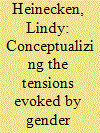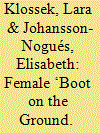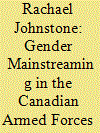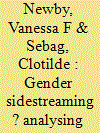|
|
|
Sort Order |
|
|
|
Items / Page
|
|
|
|
|
|
|
| Srl | Item |
| 1 |
ID:
146612


|
|
|
| 2 |
ID:
152317


|
|
|
|
|
| Summary/Abstract |
The South African military has adopted an assertive affirmative action campaign to ensure that women are represented across all ranks and branches. This has brought about new tensions in terms of gender integration, related to issues of equal opportunities and meritocracy as well as the accommodation of gender difference and alternative values. The argument is made that the management of gender integration from a gender-neutral perspective cannot bring about gender equality, as it obliges women to conform to and assimilate masculine traits. This affects women’s ability to function as equals, especially where feminine traits are not valued, where militarized masculinities are privileged and where women are othered in ways that contribute to their subordination. Under such conditions, it is exceedingly difficult for women to bring about a more androgynous military culture espoused by gender mainstreaming initiatives and necessary for the type of missions military personnel are engaged in today.
|
|
|
|
|
|
|
|
|
|
|
|
|
|
|
|
| 3 |
ID:
179550


|
|
|
|
|
| Summary/Abstract |
The Indian government has presented itself as a champion of gender mainstreaming in UN peacekeeping. At the same time, the domestic security sector in India continues to create a gender-segregated environment and experiences of uniformed women in the field show remaining barriers for gender equity. Given this contradiction, the article examines the ambivalence inherent to Indian gender mainstreaming of peacekeeping units. We argue that transnational norms, such as gender mainstreaming, are embedded in larger norm bundles, and we combine the literature of norm localization and norm contestation in our conceptual framework to illustrate how India localizes parts of the gender mainstreaming norm bundle whilst contesting others. We find that India’s localization of the gender mainstreaming norm has meant to pursue an asymmetric gender-parity approach between different branches of the Indian security forces and that it has fomented a division of labour within the police corps. Moreover, we illustrate how India contests the idea of placing women in security-sensitive areas, in combat roles, and gender-integrated police units.
|
|
|
|
|
|
|
|
|
|
|
|
|
|
|
|
| 4 |
ID:
083578


|
|
|
|
|
| Publication |
2008.
|
| Summary/Abstract |
argue that gender mainstreaming across varied policy contexts may help to transform the 'inferior' status allocated to feminist international relations (IR) in relation to mainstream (masculinist) IR. I begin by outlining the problem of this inferior status, explaining the historical background to it and reasons for its perpetuation. I then explain gender mainstreaming developments and diverse ways in which they illustrate the importance of gender, including for our understanding of power and inequality. I pose questions about whether these developments and the policy practices related to them can raise consciousness in the wider IR discipline about the nature of feminist IR, and its contribution as an inclusive approach to humanity, focusing on both men and women and relations among and between them. I argue that gender mainstreaming policies related to the core IR area of human security and violence are a key challenge to the constraints of masculinist IR. I conclude that gender mainstreaming could be a site of new conversations and understanding between feminist IR and mainstream IR
|
|
|
|
|
|
|
|
|
|
|
|
|
|
|
|
| 5 |
ID:
185249


|
|
|
|
|
| Summary/Abstract |
This article uses the Canadian military’s gender-mainstreaming strategy—gender-based analysis plus (or GBA+)—as a case study to explore the implementation of gender mainstreaming in militaries. Utilizing a mixed method approach, including group interviews and surveys, we employ Jahan’s model of gender mainstreaming to understand how GBA+ has been operationalized. We argue that the implementation of GBA+ in the Defense Force constitutes a more superficial integrationist approach to the implementation of gender mainstreaming rather than a transformative, agenda-setting approach, despite the internalization of messaging to the contrary by many in the Canadian Armed Forces (CAF) and the Department of National Defence (DND). While not ideal, we suggest that an integrationist approach does not necessarily mean a GBA+ agenda will fail in a male-dominated organization like the CAF; rather, we contend that it could constitute a valuable starting point for progressive, large-scale change.
|
|
|
|
|
|
|
|
|
|
|
|
|
|
|
|
| 6 |
ID:
178500


|
|
|
|
|
| Summary/Abstract |
Twenty years after the passing of Resolution 1325, the participation of women as military personnel in peacekeeping operations remains limited. Women currently comprise just under five per cent of military personnel in UN peacekeeping missions, and the UN consistently calls for more. We contend the low numbers of female military personnel in peacekeeping reflects a lack of gender mainstreaming in national militaries globally. This article introduces the problem of sidestreaming, the practice, deliberate or unintentional, of sidelining women and relegating them to specialised spaces in international peace and security while attempting gender mainstreaming or increased gender integration. Drawing on empirical evidence from national militaries we show how and where sidestreaming occurs with the result being that women remain clustered in gendered and low-status spaces in national militaries and in specialised spaces in peacekeeping operations. This has a negative effect on retention and recruitment contributing to the low numbers of female peacekeepers in UN peace operations. We conclude that gender mainstreaming in its fullest sense will require military reform that decouples violence and combat skills from masculinity and inclusive research strategies that engage men as well as women.
|
|
|
|
|
|
|
|
|
|
|
|
|
|
|
|
| 7 |
ID:
080624


|
|
|
|
|
| Publication |
2008.
|
| Summary/Abstract |
Decisions that affect the life chances and wellbeing of citizens are increasingly being made in international settings that are only indirectly connected to the democratic institutions where those citizens have a voice. Global and regional governance organizations not only lack the democratic legitimacy of states but also there are few mechanisms that make them accountable to the citizens that their decision making most affects. Civil society groups have exposed this gap between the jurisdiction and the impact of supra-state organizations and have proposed various ways of addressing it. Feminist analysis has highlighted the masculine preserve of traditionally closed-door multilateral trade and security discussions and negotiations. It has also highlighted the unequal and deeply structural gender impact of this style of policy making. Women's movements have found international organizations to be especially challenging institutional settings within which to achieve policy influence. Yet transnational feminist networks have the political and ethical resources to make global governance organizations more accountable to a broader constituency. This article explores this phenomenon through an examination of the Women Leaders' Network (WLN) and its efforts to make Asia Pacific Economic Cooperation more accountable to women as political and economic actors. The WLN is the only women's transnational advocacy network to have directly and routinely engaged with an economic intergovernmental organization. An analysis of the limits and potentials of the WLN model highlights accountability issues for APEC (Asia Pacific Economic Cooperation) and other regional or global governance organizations, as well as for the WLN and transnational civil society networks more generally
|
|
|
|
|
|
|
|
|
|
|
|
|
|
|
|
| 8 |
ID:
178248


|
|
|
|
|
| Summary/Abstract |
Leading feminist scholars and activists have critiqued the current impact of South Africa’s provisions for gender equality and sexual rights. The country boasts one of the most progressive constitutions in the world, and its formal mechanisms for gender transformation and sexual citizenship are – at a global level – pathbreaking. At the same time, however, violence against women, gender non-conforming people and gays and lesbians or ongoing gender-based injustices in workplaces, educational institutions and many homes testify to the fact that such measures have not transformed ideological beliefs, institutional cultures and power relations in many public and domestic contexts. This article confronts the disjuncture between the formal provision of rights and actual practice, by analysing the effects of provisions devoid of transformative impact. It is argued that the country’s seemingly democratic arrangements for gender justice and sexual citizenship reproduce new forms of governmentality, biopolitics and biopower. By drawing on the work of Jasbir Puar, the article argues that South Africa’s imagining as a democratic state is based largely on its provision of rights around sexuality and gender, and in relation to peripheries that are ‘measured’ by the absence of these. In the global imagining, gender equality and sexual citizenship currently serve as tropes for definitive freedoms and democracy. The recognition of gender equality and sexual citizenship ratifies a particular international understanding of ‘democracy’, one that is congruent with global neoliberal standards, and that actively reproduces the gendered, heteronormative, classist and racist status quo.
|
|
|
|
|
|
|
|
|
|
|
|
|
|
|
|
| 9 |
ID:
093781


|
|
|
|
|
| Publication |
2010.
|
| Summary/Abstract |
Gender mainstreaming is portrayed as the next step in the global gender equality landscape and has been widely adopted internationally in a variety of governments and political organisations. However, the radical potential of gender mainstreaming to transform organisations has not been fulfilled. In this article, I explore three paradoxes which are inherent in the intent, implementation and institutionalisation of gender mainstreaming. I argue that we cannot fully understand these global paradoxes without a better understanding of local experiences which underpin them in the everyday working lives of those people involved in advocating gender mainstreaming. Using results from an institutional ethnography of the implementation of the Gender Equality Duty by gender mainstreaming advocates in the Scottish Executive, I show that bureaucratic practices, fossilised norms and the continued reliance on soft measures to promote mainstreaming are reflections at the local level of barriers to the advancement of global gender mainstreaming. By taking seriously the local practices and knowledge of those who do gender mainstreaming, we can reflect on the inherent tensions within gender mainstreaming that prohibit its ability to truly transform the gender landscape at both the local and global level.
|
|
|
|
|
|
|
|
|
|
|
|
|
|
|
|
| 10 |
ID:
143308


|
|
|
|
|
| Summary/Abstract |
This article considers how, in the light of contemporary military transformations, feminist theorizing about women’s military participation might be developed to take account of an emergent reality: the inclusion of increasing numbers of women in a range of roles within armed forces. A brief overview of established debates within feminist scholarship on women’s military participation is provided, and we explore the trajectory of feminist strategies for change within both militaries and other institutions. The promise and limitations of mainstreaming gender into security institutions, as a consequence of UN Security Council Resolution 1325, are discussed. The article argues that existing feminist critiques often remain deterministic and have too readily dismissed the possibilities for change created by women’s military participation, given the context of military transformations. Drawing on the idea of the regendered military, the article presents a conceptual strategy for considering how feminist theorizing about the gender–military nexus can take seriously women’s military participation while remaining alert to feminist political goals of gender equality, peace and justice.
|
|
|
|
|
|
|
|
|
|
|
|
|
|
|
|
|
|
|
|
|